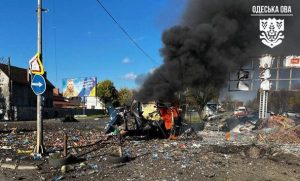
Will Orthodox Russia never stop this immoral war? – bringing scandal on the Orthodox Church.
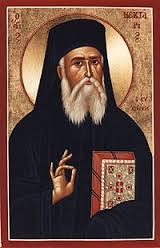
Saint Nektarios, the Wonderworker of Aegina
November 9
If any here present heard the sermon last Sunday at Saint Nicholas Church, Cedarburg, Wisconsin, I take no offense if you now go do something else, because here it comes again. Likewise with you long-time followers of this Blog. However, we have many new readers who do not know these stories. Besides, I just love to tell them.
This is the account of how Saint Nektarios the Wonderworker took hold of me – a mysterious, sometimes comical story, with a wonderfully happy ending.
Saints
Perhaps, for the sake of any new Orthodox or non-Orthodox readers, I should say a little about saints. Saints are not “little gods” who work independently. Saints are God’s servants. If He so chooses, once in a while they get directly involved with people here on earth. How can this be? It’s because Jesus Christ by His death and resurrection has broken down the wall dividing earth and Heaven, so that now there is some traffic back and forth.
The Life of Saint Nektarios

I’ll make this brief, omitting much.
Nektarios came from Selybria, a Greek town west of Istanbul (Constantinople), now in Turkish territory. As a young man he was ordained and sent to serve under the Patriarch of Alexandria. There he excelled so greatly that the Patriarch made him a bishop, which made others jealous, and they spread false rumors about him. The Patriarch believed them, and Nektarios was sent back to Greece where for a time he lived in poverty, still dogged by the rumors, wherever he went.
Eventually he became head of a boys’ school in Athens where things went very well. He wrote many books, now available on Amazon and elsewhere. Then some young women asked him to found a monastery for them, which they did, on the island of Aegina just off the coast from Athens. His was not an outwardly noteworthy life. Through it all he was a man of deep humility and prayer. At the end, suffering much pain, he was sent to an infirmary in Athens where he died, on November 9, 1920, not long ago by Orthodox standards – or by mine!
And then it began. As they prepared his body, they laid his sweater on the bed of the man next to him. The man who had long been paralyzed immediately stood up and walked. Since then over 2000 healings have been attributed to Saint Nektarios, especially of people with cancer. Sometimes he has appeared in dreams, a few times in person, to heal or give advice. He was finally officially declared a saint by the Ecumenical Patriarch in 1991, but Orthodox people knew he was a saint long before that. I have been to many churches in Greece, and all of them had large icons of Saint Nektarios the Wonderworker.
 Have you seen the film Man of God * which tells the life of Saint Nektarios? It was in theaters a few years ago. It’s available now on Amazon Prime, Youtube and a few other places. Be sure to watch till after the end of the credits.
Have you seen the film Man of God * which tells the life of Saint Nektarios? It was in theaters a few years ago. It’s available now on Amazon Prime, Youtube and a few other places. Be sure to watch till after the end of the credits.
- Please do not confuse this with another film The Man of God, which is most definitely not about a saint!
How I first encountered Saint Nektarios.
A strange story which seemed to have nothing to do with healing from cancer, until… but I’m getting ahead of myself.
Back in the year 2002 my dear Khouria Dianna gave her ok for me to go on pilgrimage to Greece. I spent four days on Mount Athos visiting Father Barnabas (+ now departed), a man from our parish who became a monk there. After that I took the train down to Athens to recover for a couple of days. (Four days on Athos just about wore me out.) Then I wanted to visit Saint Nektarios where his body lies on the island of Aegina.
- Pronounced Egg-ena, with a guttural “g”
A couple from Saint Nicholas Church had been there. Tony tried to describe it and couldn’t find the words. He said: You must go. So I read a book about Saint Nektarios’ life. When I came to that first healing I got the holy chills, and I knew I had to go.
To Aegina and Saint Nektarios
Now, I always plan my trips carefully. This time for some reason I did not. All I knew was I had to get to Piraeus, the port of Athens, and take the ferry to Aegina. I missed the 9 o’clock ferry. They cancelled the 10 o’clock. I had reservations that evening on the ferry to Crete, so I would have to get back to the hotel in Athens, get packed and then back to the port again. Would I have time? Would I have to give up going to Aegina? I heard myself saying: “Saint Nektarios, Agios Nektarios, please. I want to visit you.”
Well…! On Athos, of course I wore my cassock/rassa/gibby. But for the rest of the trip, I did not. Priests all dressed up get special treatment. I liked to be an ordinary person and mingle and talk with ordinary people. So keep in mind that this day I wore “civvies”.
I had been forewarned that almost everyone at Saint Nektarios would speak only Greek. That left me on edge, because I spoke almost no Greek. I figured somehow God would take care of it.
And so He did.

On the 11 o’clock I sat down beside a young monk who I hoped would know the way. I tried to communicate in Greek. He said “My Greek is not very good, but I speak English!” He was from Trinity-Saint Sergius Monastery in Russia. He said “A man I know is going to drive me to the monastery. Come along.” So I did. Free ride! Then he gave me a tour of everything, places most people don’t go. We stood before the icon of the Virgin Mary where Nektarios was inspired to write his hymn “O Pure and Virgin Lady”. He sang it in Russian. I didn’t know it in English. Now I do.
I’m sorry. The only way to hear this lovely hymn is to push “Watch video on YouTube”. When you wish to return to the Post (please do!), just push the return arrow at the top left of your screen.
English begins at 1.40. Courtesy of Eikona
I prayed before Nektarios’ tomb, his relics, with other pilgrims who were continually coming and going. The place is holy, filled with an invisible light or aura or …. I can’t describe it. You need to go there.
After a while I realized I had no idea how to get back to the port! So I walked down to the bus stop. There was a family there, so I muttered in my primitive Greek “Pou einai to leoforio?” (“Where’s the bus?”) The man said “We speak English! We’re from Montreal. We’re getting a taxi. Come along.” They paid my way. Another free ride. More English speakers.
At the port I had time to kill, so I went into a kafenio to get some ice cream. They listed vanilla, strawberry and chicago. I asked the man: “What is chicago?” He said: “Very good. Very good.” So I took it. Now, some of you may know that I have a passion for chocolate. So what was “chicago”? It was chocolate ice cream with chocolate sauce! I got back to Athens with hours to spare. I wandered the Plaka for a while, got my suitcase from the hotel and was at the ferry for Crete about two hours before departure.
I had told Saint Nektarios I wanted to visit him, and it felt like I had just been carried along all day. Was it only coincidence? I didn’t know, but it didn’t feel like it. I kept smiling and saying “Thank you, Saint Nektarios. Thank you, Saint Nektarios.”
Saint Nektarios plays “tricks”.
I love Greece. Every year or two I went back. I’d go over for a couple of weeks and always visit Saint Nektarios. Then Khouria Dianna would join me for a couple of weeks. I always came back refreshed, ready to go again. Greece was good for me. I get homesick for Greece.
Now Saint Nektarios began to play “tricks” with me. I don’t know what else to call them.
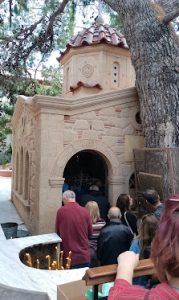 The second time I visited Saint Nektarios, I said my prayers and sat down outside the shrine just to watch the people coming and going. A voice next to me said Are you an American? She already knew who I was. It was a couple I had worked with in the Episcopal Church here in Milwaukee 25 years before. She and her husband had moved away, had become Orthodox. He was now an Orthodox priest. Now … what were the chances: 8000 miles from home on exactly the same day, at the same time, in the same place, on the same bench? A coincidence? Really?
The second time I visited Saint Nektarios, I said my prayers and sat down outside the shrine just to watch the people coming and going. A voice next to me said Are you an American? She already knew who I was. It was a couple I had worked with in the Episcopal Church here in Milwaukee 25 years before. She and her husband had moved away, had become Orthodox. He was now an Orthodox priest. Now … what were the chances: 8000 miles from home on exactly the same day, at the same time, in the same place, on the same bench? A coincidence? Really?
Sometimes what happened was just enough to make me wonder. One time to get to the port from my hotel I had to take three Metro trains. I was in no hurry. I hoped to make the 9 o’clock, more likely the 10. At the first change, the next train sat waiting. At the second stop, the next train sat there waiting. At the port, I didn’t hurry. I could see I’d just missed the 8 o’clock, so I ambled over to the dock. There sat the 8 o’clock, running late. The ticket agent said “Hurry, mister, they’re just closing the gate.” So there I was headed for Saint Nektarios two hours early. Hmm…?
Another time I had visited Saint Nektarios late in the day. Even then, the same holy invisible light (I can’t describe it) was there as it got dark. On the ferry back to Piraeus we could see lightning in the north. At the port I hurriedly got a taxi back to the hotel instead of waiting for the tram, the light rail. A few minutes after I got there, the storm hit: flood everywhere. The first floor of the hotel was deep in water. All ferries were cancelled. If I’d got back only a few minutes later I’d have been stranded all night, probably at the port. Hmm… again.
Most of you know that I graduated in meteorology, atmospheric science. I long ago realized there’s a lot science can’t explain, with many unknown factors in weather forecasting. As I recall, in class they never taught us about the effect of saints on the weather! However, the scientific method is to take the evidence and see what conclusion it leads to. There had now been so many “coincidences” that surely they couldn’t all just be coincidence.
After the next two I felt sure Saint Nektarios was at work.
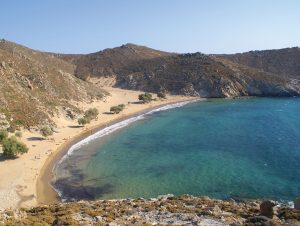
I was on the island of Patmos. In the afternoon I’d go to a remote beach ‘way out at the end of the island – where there were few people around, so no, uh, distractions – and I’d read Saint John’s Gospel, Epistles and Revelation. * In my backpack I carefully put my books sealed in one plastic back, my food and water in another plastic bag, my keys in a third well-sealed plastic bag.
- As you know, he was exiled to Patmos.
Late in the evening I climbed up to the car to head home. I reached for my keys. Not there. I checked again. Not there. I went back to the beach. No keys. Came back to the car and checked my pack again. No keys. I started to panic. There was no one around for miles. Without thinking, out of my mouth came “Nektarios, help!” Not so much as “please”. Then I looked into the back pack, and there right on top were the keys! I am positive they had not been there ten seconds before. Definitely no coincidence this time.
There was more to come. I was on the south shore of Crete and drove over the mountain to the town where Saint Paul was stranded, then a busy port called Fair Havens, now a tiny isolated village called Kali Limenes. I arrived and looked at the gas gauge: Empty. (How could I have been so stupid?) There was no petrol station for miles around. By now I knew what to do: I said, “Saint Nektarios, please help.” I explored the village, then took a book and went down to the beach for a couple of hours. When I got back to the car I looked at the gas gauge – I swear this is true – and it showed well over a third full. Saint Nektarios, how did you do that? Maybe the church could raise money by putting a gas pump out front labeled “Saint Nektarios”?
What was it all about?
“Hagios Nektarios, why are you doing this? playing clever tricks with me? You’re supposed to be busy healing people who suffer from cancer.”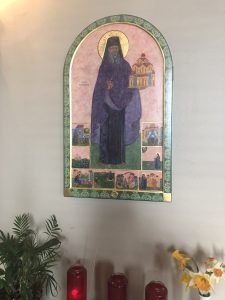 Each year I collected names to take to Saint Nektarios for the nuns to offer in intercession, and I’d also collect money from the congregation. Finally it was over 2000 names and 300 Euro. The little widow * who guarded the chapel would see me, get a big smile and cry “Amerikanós! 𝐴𝑚𝑒𝑟𝑖𝑘𝑎𝑛ó𝑠!” She even let me take pictures where it was not allowed. Devotion to the blessed saint was growing back home at Saint Nicholas Church. We now have a large icon of him, with candles burning before him. I decided maybe that was Saint Nektarios’ purpose in going after me. So on the next two trips I said to him: “Please, no more tricks. You’ve got my attention now, for whatever reason.”
Each year I collected names to take to Saint Nektarios for the nuns to offer in intercession, and I’d also collect money from the congregation. Finally it was over 2000 names and 300 Euro. The little widow * who guarded the chapel would see me, get a big smile and cry “Amerikanós! 𝐴𝑚𝑒𝑟𝑖𝑘𝑎𝑛ó𝑠!” She even let me take pictures where it was not allowed. Devotion to the blessed saint was growing back home at Saint Nicholas Church. We now have a large icon of him, with candles burning before him. I decided maybe that was Saint Nektarios’ purpose in going after me. So on the next two trips I said to him: “Please, no more tricks. You’ve got my attention now, for whatever reason.”
- How did I know she was a widow? At least away from the city, Greek widows dress in black.
I was soon to learn the real reason. In the year 2015 my Khouria Dianna had major aggressive cancer. The surgeon said he felt sure he could get it. Nevertheless I was very afraid. But by then I knew where to turn. I prayed to the Lord Jesus, of course, but I bombarded Saint Nektarios – I had seen what he would do for me – asking his help almost all the time when my mind was free. And every day I quietly said the long Akathist Hymn to Saint Nektarios, begging him to pray to God to heal her.
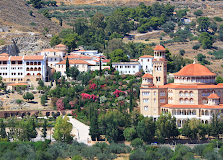
Now, with God we never know exact cause and effect, what His immediate will is or how our prayers affect it. However, ten years later, as I write this, there Dianna sits across from me in our living room, alive and well. The year after her healing, the two of us visited Saint Nektarios together, and I was so very grateful. I am so very grateful.
Why his tricks? I think it was the only way to get my attention. I am slow sometimes. Sometimes my mind and heart and soul are just all over the place. Well… he got my attention!
That was almost the end of my adventures with Saint Nektarios. A few years later I was in Greece again, and he (with help from Saint Phanourios *) … there’s no time to tell story now.
- The Orthodox saint who helps find lost things, like Saint Anthony among Roman Catholics.
The End
In my prayers morning and evening I ask Saint Nektarios to pray for me and help me, and come to the aid of many people. Does this interfere with my love of Jesus Christ? No way. Those who know me know that I love my Lord Jesus with all my heart and soul and mind. But, among the saints, Saint Nektarios the Wonder-worker of Aegina will always be one of my two best friends. Who’s the other? In two weeks I’ll write about My Adventure with Saint Nicholas. Some of you have not heard that story yet.
Next Week: I said I was gonna do it, so I’ve gotta do it: Charlie Kirk and Christian Nationalism
Week after Next: We’ll be visiting family ![]() so you’re going to get a Rerun.
so you’re going to get a Rerun.
Thanks for sharing your special bond with Saint Nektarios and the blessings received.